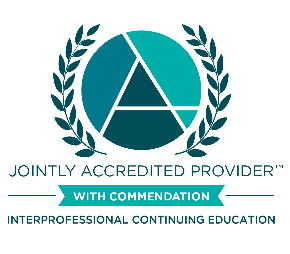A Resource for Healthcare and Social Services Professionals
Estimated time to complete: 1 hour
This training will identify common co-occurring disorders in people with substance use disorders and review basic therapeutic and pharmacologic interventions. CEs: CME (1.00); Nursing (1.00), Pharmacology (0.50)
This training will identify common co-occurring disorders in people with substance use disorders and review basic therapeutic and pharmacologic interventions.
This training satisfies 1.00 hours of the required 8 hours of training for DEA-registered practitioners. The Medication Access and Training Expansion (MATE) Act was included in the Consolidated Appropriations Act, 2023. The MATE Act requires increased training for Drug Enforcement Administration (DEA)-registered physicians and practitioners—specifically, a one-time eight-hour training requirement on treating and managing patients with opioid or other substance use disorders.
Medical professionals with prescriptive authority, nurses and support staff who support them looking to increase provision of care for patients with substance use disorder.
Other Faculty
Daniel P. Alford, MD, MPH, FACP, FASAM, CME Course Director, has no relevant financial relationships to disclose.
Colleen LaBelle, MSN, RN-BC, CARN Nursing Course Director, has no relevant financial relationships to disclose.
Members of the planning committee have no relevant financial relationships to disclose:
Ilana Hardesty, MA, Planning Committee
Victoria Rust, BS, Planning Committee
Vanessa Loukas, MSN, FNP-C, CARN-AP (she/her)
Vanessa is an assistant professor of medicine at Boston University Chobanian & Avedisian School of Medicine, a Clinical Nurse Educator for Boston Medical Center's Grayken Center for Addiction Training and Technical Assistance (TTA) team, and a nurse practitioner at BMC. She has expertise in managing substance use disorders, co-occurring psychiatric conditions, and infectious diseases in primary care settings. Her clinical interests also include harm reduction, low-barrier treatment, medical addiction groups, and improving care for persons involved in the criminal-legal system. Through her primary role on the TTA team, Vanessa contributes to peer-reviewed publications, evidence-based clinical guidelines, development and delivery of continuing education programs, and other resources for providers supporting patients with substance use disorders. Vanessa practiced as a nurse practitioner and was the program director for the addiction treatment program at the South End Community Health Center (SECHC), caring for high-risk patients with substance use disorders and psychiatric diagnoses. This work integrated harm reduction, on-demand treatment, infectious disease treatment, and medical addiction groups, including within the male/female re-entry/recovery units at the Suffolk County House of Corrections. Vanessa received her MSN from Simmons University and is a Certified Advance Practice Addictions Nurse (CARN-AP) through the Addictions Nursing Certification Board (ANCB).
Vanessa has no relevant financial relationships to disclose.
Following this training, participants will have the knowledge to:
Boston Medical Center Grayken Center for Addiction Training and Technical Assistance, Massachusetts Department of Public Health, Bureau of Substance Addiction Services (DPH/BSAS)
Funding for out of state attendees is provided by the Opioid Response Network (ORN).
Funding for this initiative was made possible (in part) by grant no. 1H79TI081968 & 1H79TI085588-02 from SAMHSA. The views expressed in written conference materials or publications and by speakers and moderators do not necessarily reflect the official policies of the Department of Health and Human Services; nor does mention of trade names, commercial practices, or organizations imply endorsement by the U.S. Government.
 In support of improving patient care, Boston University Chobanian & Avedisian School of Medicine is jointly accredited by the Accreditation Council for Continuing Medical Education (ACCME), the Accreditation Council for Pharmacy Education (ACPE), and the American Nurses Credentialing Center (ANCC), to provide continuing education for the healthcare team.
In support of improving patient care, Boston University Chobanian & Avedisian School of Medicine is jointly accredited by the Accreditation Council for Continuing Medical Education (ACCME), the Accreditation Council for Pharmacy Education (ACPE), and the American Nurses Credentialing Center (ANCC), to provide continuing education for the healthcare team.
Continuing Medical Education (CME): Boston University Chobanian & Avedisian School of Medicine designates this enduring material for a maximum of 1.00 AMA PRA Category 1 Credit(s)™. Physicians should claim only the credit commensurate with the extent of their participation in the activity.
Nursing Contact Hours: 1.00 number of contact hours of which 0.50 are eligible for pharmacology credit.
This program expires on 07/14/2025.
Requirements for Credit: To earn credit, one must complete the pre-test, video, and pass the post-test evaluation. The evaluation closes two weeks after watching the video.
Speaker/Planner Disclosures & Disclaimer
Boston University Chobanian & Avedisian School of Medicine asks all individuals involved in the development and presentation of Accredited Continuing Education activities to disclose all financial relationships with ineligible companies. This information is disclosed to all activity participants prior to the start of the educational activity. Boston University Chobanian & Avedisian School of Medicine has procedures to mitigate all relevant financial relationships with ineligible companies. In addition, faculty members are asked to disclose when any unapproved use of pharmaceuticals and devices is being discussed.
In accordance with the Standards for Integrity and Independence in Accredited Continuing Education, all relevant financial relationships that faculty, planners, authors, and anyone who may be in control of content have with ineligible companies have been mitigated.
Faculty members do not plan on discussing off-label/investigational uses of a commercial product.
THIS CONTINUING EDUCATION PROGRAM IS INTENDED SOLELY FOR EDUCATIONAL PURPOSES FOR QUALIFIED HEALTH CARE PROFESSIONALS. IN NO EVENT SHALL BOSTON UNIVERSITY BE LIABLE FOR ANY DECISION MADE OR ACTION TAKEN IN RELIANCE ON THE INFORMATION CONTAINED IN THE PROGRAM. IN NO EVENT SHOULD THE INFORMATION CONTAINED IN THE PROGRAM BE USED AS A SUBSTITUTE FOR PROFESSIONAL CARE. NO PHYSICIAN-PATIENT RELATIONSHIP IS BEING ESTABLISHED. IN NO EVENT SHOULD INFORMATION IN THE MATERIALS REGARDING LAWS, REGULATIONS, OR LEGAL LIABILITY BE CONSIDERED LEGAL ADVICE OR USED AS A SUBSTITUTE FOR CONSULTING WITH AN ATTORNEY.